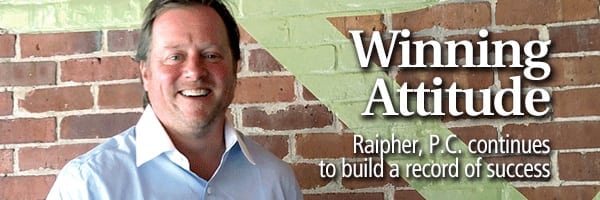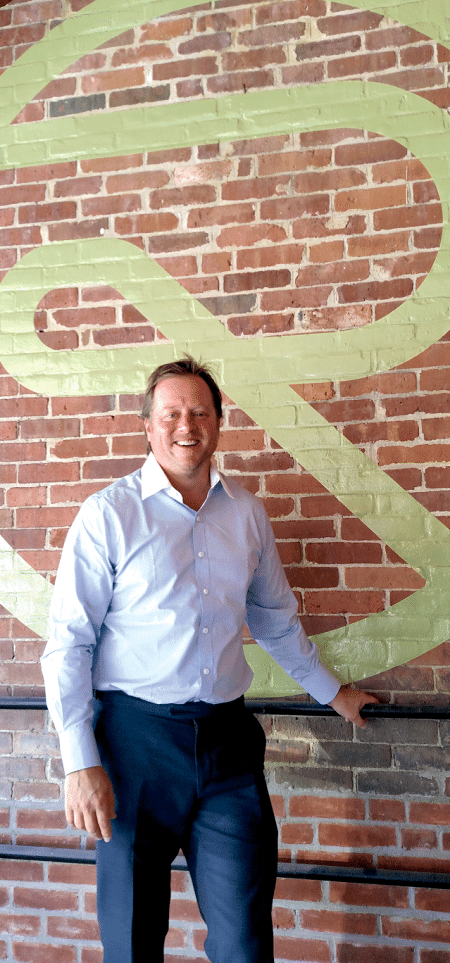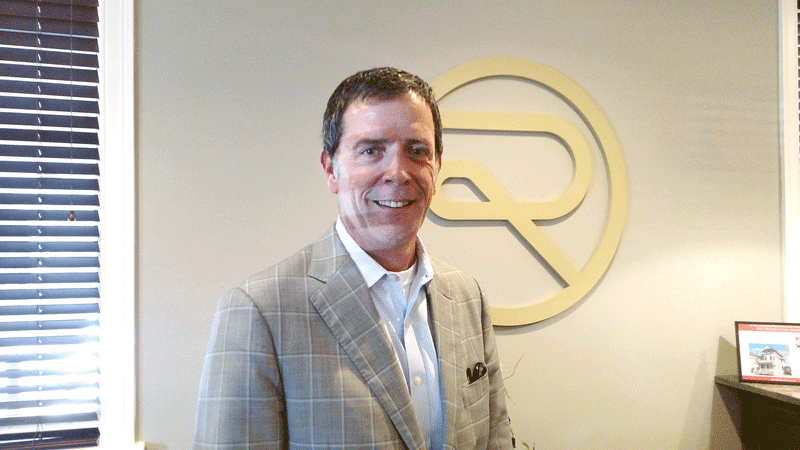
Raipher, P.C. Continues to Build a Record of Success
Winning Attitude

Raipher Pellegrino
Its marketing materials are emblazoned with the phrase ‘for the win.’ But at Raipher, P.C. — the law firm Raipher Pellegrino founded in 1994 and put on the map with a series of high-profile victories — the end result is only part of a successful case. Just as important, Pellegrino notes, is helping clients, who are often suffering through the worst crisis of their lives, navigate the legal system and get back to some semblance of normalcy. That, in itself, he says, is also a win.
Raipher Pellegrino may be best-known for winning a handful of high-profile court cases. There was his defense in 2002 of a man accused of breaking into a UMass dorm room with attempt to rape, arguing — successfully — that the defendant was sleepwalking. Then, as a plaintiff’s attorney, he secured a $6 million settlement for the family of a woman killed when a Big Dig tunnel collapsed on her car in 2006.
Such cases may not represent the day-to-day work of Pellegrino and his team of attorneys at Raipher, P.C. in Springfield, but they did help raise his profile, which is why he works on cases for clients nationally.
“It’s a matter of being able to prove results year in and year out, on complex, oftentimes high-profile cases, which can be more difficult to handle because you’re worried about not just the legal aspect, but the public-relations aspect of the case,” Pellegrino told BusinessWest.
Perhaps most recognized as a personal-injury firm, Raipher also focuses on criminal defense, family law, and general business law, from commercial transactions to business litigation and everything in between. Pellegrino also has a special interest in charter schools, a model he supports, and has represented them in matters ranging from financing to litigation.
When he launched his firm in 1994, “the original concept was personal injury and criminal litigation, but not so much on the transactional side. We’ve evolved since then,” he said, noting that the firm currently boasts 12 attorneys.
In any case, success isn’t measured only in decisions and settlements, he explained, but in meeting the myriad needs of clients who are often dealing with life-changing situations.
“When someone is in a circumstance where they need a lawyer, it’s a moment of anxiety. Our goal here is that they should feel less anxious after they contact us,” said Sean O’Connor, who joined the firm 18 months ago in a management capacity, overseeing the case loads of each attorney and handling marketing and other non-legal aspects of the business, in an effort to modernize the practice.
SEE: List of Law Firms
“We go up against some of the largest forms in the U.S. and the world, with over 1,000 attorneys,” Pellegrino added. “They’ll attempt to bury you with process, putting five or six lawyers on the case and sending documents 24/7. The modernization of the practice on the intellectual side and also in workflow is important; it allows us to take on large firms from right here in Western Mass.”
For this issue’s focus on law, BusinessWest sat down for a candid chat with Pellegrino and O’Connor about how they take on those challenges — and why the process of resolving each case is as important as the end result.

Sean O’Connor says much of the firm’s business comes from client referrals, which he considers “a real compliment to an attorney.”
Sweet Relief
Personal injury is a broad field in itself, encompassing car accidents, product liability, medical malpractice, slip-and-fall injuries, and workplace injuries, just to name a few. Pellegrino cited a recent, complex case with multiple defendants, in which the plaintiff was killed in a manufacturing plant.
“We brought suit against the company that designed the machine and the employer, and we were able to settle that for several million dollars despite having serious legal obstacles which could have precluded an award to the plaintiff,” Pellegrino said, including a state workers’ compensation statute that throws up barriers to suing employers. “We were able to navigate around those issues and resolve that case.”
The defendant was a Boston-based company, and his sole heir lived in Puerto Rico, but despite the presence of many large personal-injury firms in the Boston area, the plaintiff sought out Raipher, an example of the firm’s reputation for handling difficult cases — work that begins with the first meeting with the client.
“We don’t try to sell the firm; we try to educate people. We believe education is the building block of what we do,” he explained, likening it to a different kind of major life event. “If you’re going in for surgery and have no concept what the surgery is about, what the process is, it can be frightening to go through it because of the fear of the unknown. Well, nobody prepares for an accident; you don’t wake up and say, ‘I might have an accident today.’ But if you have a law firm in mind, and you know they’ve been through it time and time again, and they can walk you through the process, it takes some of the fear away.”

The firm uses the motto ‘for the win,’ but Raipher Pellegrino emphasizes that the process of finding relief, restitution, or justice is as important as the end result.
And monetary restitution isn’t the sole goal, he added. “We also want to let them get on with their lives. They may be out of work, have loss of income, physical pain; that’s what they should be focused on, getting better and back to life as quickly as they can. We routinely tell clients, ‘let us do our job and make your life easier.’ And if we can make the process more understandable, that’s part of our job — not just getting a monetary settlement.”
Pellegrino said his firm has built its client base organically. “We have generational clients, we’ve been referred by clients’ family and friends, and we’ve had referrals from attorneys, not just in Western Mass., but around the country. I’ve had jurors hire me.”
That makes sense, he added, since jurors have a front-row seat to how an attorney works. If one is impressed and, down the road, has a need for a lawyer, they’ll remember what they saw in court. “That feels good, when people appreciate you and want to hire you. We take pride in our work and in delivering a good product.”
Added O’Connor, “the greatest complement we get here is client referrals. Raipher has clients he’s known for 20 years who still refer people to us. That’s a real compliment to an attorney, to have the confidence of past and current clients.”
To earn that confidence, Pellegrino said, his team is dedicated to staying educated on all facets of the law they handle. “A doctor doesn’t stop reading about new surgeries. We’re constantly adapting to changes in the law, whether regulatory or statutory.”
When asked whether the regulatory landscape has become more burdensome over the past decade or so, he said many lawyers would say yes. “And that certainly requires a broader spectrum of knowledge to litigate a claim.”
But some changes have been beneficial for attorneys, he added. For instance, only recently have lawyers in Massachusetts been allowed to ask potential jurors specific questions during the voir dire process, allowing them to dig into biases — whether conscious or subconscious — and establish their best opportunity to ensure a level playing field. In addition, lawyers can now demand a specific award amount at trial, which can make it easier to demonstrate the value of an injury, loss, and suffering to a jury.
And jurors take these matters seriously, Pellegrino said, noting that, while people often feel hesitant when summoned to jury duty, once they’re empaneled, they tend to embrace their responsibility. In fact, he noted, jurors are often frustrated they can’t get more information, though there are good reasons behind the rules for which pieces of evidence can be entered into the record and which can’t.
He recalled one criminal-defense case that fell apart for the prosecution during cross-examination and was quickly settled. “The jury waited for me outside the court to talk to me; they wanted to ask about more underlying facts of the case. It shows how they’re engaged, and they take it seriously.”
For the Win
Pellegrino certainly takes his work seriously, even though personal-injury law often suffers from negative perceptions in society.
“The only way our society knows how to compensate someone for a civil loss is monetarily,” he said. “One of the best mediators in the country likes to ask, ‘if I could give you your leg back or offer you $100 million, which would you take?’ Inevitably, the person says, ‘I’d want my leg back.’ So it’s clear no amount of money can adequately compensate for your leg.”
I tell everyone, ‘don’t go into the practice of law for money. It serves society in many ways, and if you put your heart and soul into it, it’s one of the most gratifying professions you can have.”
As a result, he went on, it can be difficult to put the value of a death, injury, or physical loss in financial terms. “It’s constantly evolving, and so many factors go into it. In every case, those factors change. There are different ways to value it and monetize it. It’s not simply, someone gets in an accident and makes a demand, and you give them that money. It’s far more complex.”
O’Connor said he often finds himself explaining this concept at dinner parties. “People often don’t want to bring a lawsuit because there’s a stigma. But there is literally no other way to compensate you for someone else’s wrong. It’s not your stigma. Someone else’s negligence caused you harm. So the stigma is unfortunate.”
But Pellegrino sees the value of his work in the lives of his clients, and doesn’t worry about public perception.
“I tell everyone, ‘don’t go into the practice of law for money,’” he told BusinessWest. “It serves society in many ways, and if you put your heart and soul into it, it’s one of the most gratifying professions you can have.”
The emotions cut deep in both wins and losses, he added. In the Big Dig case, he recalled being happy for the plaintiff, who wouldn’t get his wife back, but could at least move on with his life having received some compensation and an assurance that it wouldn’t happen to someone else.
Then, in a criminal-defense case, “you can lose the case, and the client is going away to be incarcerated for 10 years, and they’re thanking you and hugging you and telling you how appreciative they are of your effort,” he said. “That’s an odd feeling. But at the end of the day, you’re not going to win every case, but if you put your heart and soul into it, the client knows that. They know you can’t guarantee an outcome.”
O’Connor agreed, adding, “you feel like you disappointed them, even though they’re clearly expressing gratitude. Clients can tell whether you’re phoning it in or doing the best you can for them.”
Still, every lawyer wants to win — which is why Raipher, P.C. uses the phrase ‘for the win’ in its marketing materials.
“I tell people, ‘you almost have to hate losing more than you like winning,’” Pellegrino said. “And if I lose, I’ve got to know that I did everything I could for the client.”
Joseph Bednar can be reached at [email protected]




